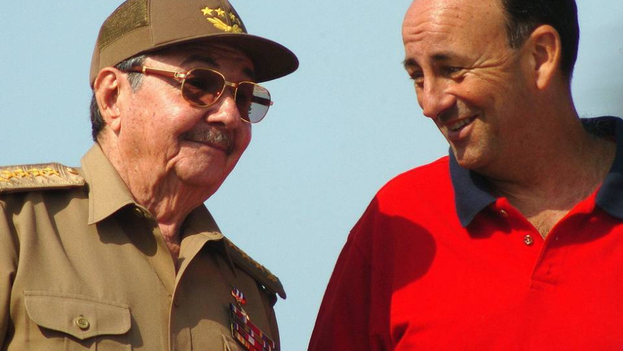
![]() 14ymedio, Zunilda Mata, Havana, 30 May 2016 – Every evening he emerges with his briefcase from the place where he purges his fate of being ousted. Carlos Lage, former vice president of Cuba’s Council of State, works on the campaign against the Aedes aegypti mosquito at the 19 de Abril polyclinic. Seven years ago he was removed from office and accused by Fidel Castro of being addicted to “the honey of power,” but today he is an employee of the Ministry of Public Health and avoids talking about his past.
14ymedio, Zunilda Mata, Havana, 30 May 2016 – Every evening he emerges with his briefcase from the place where he purges his fate of being ousted. Carlos Lage, former vice president of Cuba’s Council of State, works on the campaign against the Aedes aegypti mosquito at the 19 de Abril polyclinic. Seven years ago he was removed from office and accused by Fidel Castro of being addicted to “the honey of power,” but today he is an employee of the Ministry of Public Health and avoids talking about his past.
At 64, Lage barely practices the pediatrics that he specialized in after studying medicine. His activities as president of the University Students Federation (FEU) and subsequent responsibility as secretary general of the Union of Young Communists (UJC) left him no time to attend patients. After his political downfall, in 2009, he went through several minor administrative positions in which he has had little contact with the public.
Currently, the man who is also the former secretary of the Council of Ministers works in the Department of Hygiene and Epidemiology in a polyclinic that often receives visits from foreign delegations. More than once, in the hallways, he has run into former colleagues and diplomats who revered and honored him when rumors suggested he might become the first vice president.
The name of Lage was among the successors mentioned in the proclamation with which Fidel Castro announced his departure from power due to health problems, read out on national media on 31 July 2006. In paragraph six of that text Lage is called out for his accomplishments, such as being the “driving force of the energy revolution program” and the management of its funds. Off the Island, the vice president was seen as a civil figure with whom it might be possible to negotiate a future transition.
Between 1993 and 2009, from his high position, Lage represented Cuba at several Latin American summits, in speeches before the United Nations and at the inaugurations of numerous presidents. Popular humor baptized him as “the administrator of the madhouse,” for showing a certain sense in the midst of the political delusions that characterized those moments in Cuba.
However, rather than promote him to the position of first vice president, in February 2008, Raul Castro named the orthodox Jose Ramon Machado Ventura, thus sending a clear signal of strengthening the power of the so-called “historic generation” and avoiding potential reformers. A Reflection published by Fidel Castro confirmed the disgrace, when he accused Lage and Foreign Minister Felipe Perez Roque of having played an “undignified role.”
Now, every morning, el benjamín—the youngest son—separated from power imparts guidance to workers in the campaign against the mosquito that transmits dengue fever and chikungunya. The rest of the day he receives complaints from residents of Nuevo Vedado about the fumigators and medical personnel linked to the inspections for mosquito breeding sites.
Lage’s relations with the rest of the polyclinic workers are cordial, according to what several of his colleagues told this newspaper. Few dare to remind him of the times when his order was sufficient to appoint a director or remove an administrator. Often, after work, he offers a colleague a ride in his red-wine Russian made Lada, a replacement for the car he kept in his time in power.
In the corridors of the healthcare center he is called “the goodies bag man,” an allusion to his order at the beginning of this century that put an end to the bags with products like soap, frozen chicken and detergent that were distributed among healthcare personnel. Scornfully, his current compañeros remind him of that cut.
Not even in the domino games regularly organized at his home, where he invites other polyclinic workers, does Lage speak of that 3 March 2009, when Raul Castro removed him from his position as vice president. He was also dropped from the Central Committee of the Communist Party and lost his position as a deputy in the National Assembly of People’s Power.
“He will not mention his previous life,” an employee of the 19 de Abril laboratory told 14ymedio. “At first they maintained a visible surveillance operation” on him, said the employee, but “over time it has been lessened.”
An attempt to obtain statements from Lage himself received no response. “That man knows that silence is what keeps him alive,” commented his colleague.
